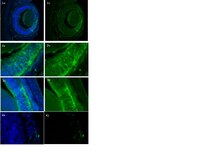ABN427 Sigma-AldrichAnti-RalDH3 (ALDH1A3)
Anti-RalDH3 (ALDH1A3), Cat. No. ABN427, is a highly specific rabbit polyclonal antibody that targets RalDH3/ALDH1A3 and has been tested in Immunofluorescence and Western Blotting.
More>> Anti-RalDH3 (ALDH1A3), Cat. No. ABN427, is a highly specific rabbit polyclonal antibody that targets RalDH3/ALDH1A3 and has been tested in Immunofluorescence and Western Blotting. Less<<Recommended Products
Overview
| Replacement Information |
|---|
Key Specifications Table
| Species Reactivity | Key Applications | Host | Format | Antibody Type |
|---|---|---|---|---|
| M, H, R | IF, WB | Rb | Affinity Purified | Polyclonal Antibody |
| References |
|---|
| Product Information | |
|---|---|
| Format | Affinity Purified |
| Presentation | Purified rabbit polyclonal antibody in buffer containing 0.1 M Tris-Glycine (pH 7.4), 150 mM NaCl with 0.05% sodium azide. |
| Quality Level | MQ100 |
| Physicochemical Information |
|---|
| Dimensions |
|---|
| Materials Information |
|---|
| Toxicological Information |
|---|
| Safety Information according to GHS |
|---|
| Safety Information |
|---|
| Storage and Shipping Information | |
|---|---|
| Storage Conditions | Stable for 1 year at 2-8°C from date of receipt. |
| Packaging Information | |
|---|---|
| Material Size | 100 µL |
| Transport Information |
|---|
| Supplemental Information |
|---|
| Specifications |
|---|
| Global Trade Item Number | |
|---|---|
| Catalog Number | GTIN |
| ABN427 | 04054839057793 |
Documentation
Anti-RalDH3 (ALDH1A3) SDS
| Title |
|---|
Anti-RalDH3 (ALDH1A3) Certificates of Analysis
| Title | Lot Number |
|---|---|
| Anti-RalDH3 (ALDH1A3) - 3234452 | 3234452 |
| Anti-RalDH3 (ALDH1A3) - 3808646 | 3808646 |
| Anti-RalDH3 (ALDH1A3) -Q2737543 | Q2737543 |










